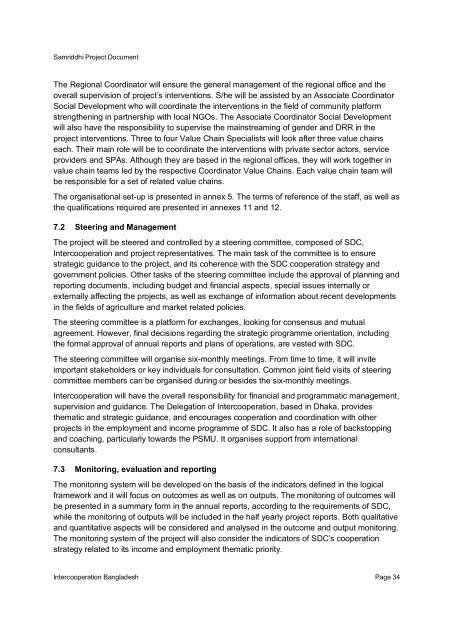Samriddhi
Samriddhi
Samriddhi
You also want an ePaper? Increase the reach of your titles
YUMPU automatically turns print PDFs into web optimized ePapers that Google loves.
<strong>Samriddhi</strong> Project Document<br />
The Regional Coordinator will ensure the general management of the regional office and the<br />
overall supervision of project’s interventions. S/he will be assisted by an Associate Coordinator<br />
Social Development who will coordinate the interventions in the field of community platform<br />
strengthening in partnership with local NGOs. The Associate Coordinator Social Development<br />
will also have the responsibility to supervise the mainstreaming of gender and DRR in the<br />
project interventions. Three to four Value Chain Specialists will look after three value chains<br />
each. Their main role will be to coordinate the interventions with private sector actors, service<br />
providers and SPAs. Although they are based in the regional offices, they will work together in<br />
value chain teams led by the respective Coordinator Value Chains. Each value chain team will<br />
be responsible for a set of related value chains.<br />
The organisational set-up is presented in annex 5. The terms of reference of the staff, as well as<br />
the qualifications required are presented in annexes 11 and 12.<br />
7.2 Steering and Management<br />
The project will be steered and controlled by a steering committee, composed of SDC,<br />
Intercooperation and project representatives. The main task of the committee is to ensure<br />
strategic guidance to the project, and its coherence with the SDC cooperation strategy and<br />
government policies. Other tasks of the steering committee include the approval of planning and<br />
reporting documents, including budget and financial aspects, special issues internally or<br />
externally affecting the projects, as well as exchange of information about recent developments<br />
in the fields of agriculture and market related policies.<br />
The steering committee is a platform for exchanges, looking for consensus and mutual<br />
agreement. However, final decisions regarding the strategic programme orientation, including<br />
the formal approval of annual reports and plans of operations, are vested with SDC.<br />
The steering committee will organise six-monthly meetings. From time to time, it will invite<br />
important stakeholders or key individuals for consultation. Common joint field visits of steering<br />
committee members can be organised during or besides the six-monthly meetings.<br />
Intercooperation will have the overall responsibility for financial and programmatic management,<br />
supervision and guidance. The Delegation of Intercooperation, based in Dhaka, provides<br />
thematic and strategic guidance, and encourages cooperation and coordination with other<br />
projects in the employment and income programme of SDC. It also has a role of backstopping<br />
and coaching, particularly towards the PSMU. It organises support from international<br />
consultants.<br />
7.3 Monitoring, evaluation and reporting<br />
The monitoring system will be developed on the basis of the indicators defined in the logical<br />
framework and it will focus on outcomes as well as on outputs. The monitoring of outcomes will<br />
be presented in a summary form in the annual reports, according to the requirements of SDC,<br />
while the monitoring of outputs will be included in the half yearly project reports. Both qualitative<br />
and quantitative aspects will be considered and analysed in the outcome and output monitoring.<br />
The monitoring system of the project will also consider the indicators of SDC’s cooperation<br />
strategy related to its income and employment thematic priority.<br />
Intercooperation Bangladesh Page 34
















